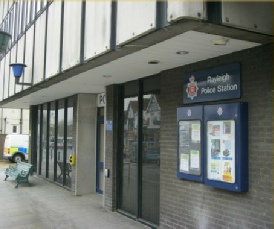








(Because of the number of links shown we no longer make direct links -
Return to Police & Messaging Contents page

November Essex Community Messages received
(Because of the number of links shown we no longer make direct links -
28/11/16
On Sunday the 27th November 2016 police received reports of criminal damage in the Rochford area. The incidents took place in Weir Pond Road, Malting Villas and The Drive. Properties in these locations had windows damaged. Please be vigilant and report anything suspicious to Essex Police on the non-
18/11/16
Please be aware of purse/wallet dipping
There are simpler steps you can take to ensure your purse is safe....
* Always keep your purse in your bag which should be zipped or closed * Keep control of your bag by holding it close to your body
* Avoid carrying too much money in your purse or wallet * Never leave your bag unattended
* Use a purse chain to secure your purse or wallet to either your bag or belt * Do not resist someone trying to snatch your purse ,wallet or bag
15/11/16
Please be aware of Black Friday online shopping scams
Blak Fricday typically sees more attempted online shopping scams than any other day of the festive shopping period.
You can take a few simple steps to reduce the chances of falling victim to scams and fraudsters. Sales of counterfeit clothes and electrical items online have increased in recent years.
Scam websites are often difficult to tell from genuine ones but there are some tell-
• At the top of the screen where the Web site address is displayed, you should see https://. The “s” indicates the Web site is secure. In many cases, you do not see the “s” until you actually move to the application page on a Web site.
• Another way to determine if a Web site is secure is to look for a closed padlock, usually displayed at the bottom right hand corner of your screen. Double-
Be aware that websites sometimes use a domain name that falsely suggests they are UK-
Offers are too good to be true, for example the price of an item is markedly lower than the market rate
Has no information about the identity of the person operating the business such as the proprietor’s name or the company’s full name
Has no geographic address for the business, preventing people from locating the business in the event of a dispute
Makes no mention of any cancellation rights
Has unfair or restrictive terms and conditions which limits people’s legal rights
Only accepts payments via money transfer services such as MoneyGram and/or Western Union
10/11/16
The Environment Agency has issued a 24/7 Hotline to try and gain intelligence to combat the illegal dumping of rubbish also known as flytipping.
If you witness or find fly-
Reports should include as many details about the incident and type/amount of waste as possible.
Some key points about if you witness such activity:
* Witnesses are vitally important in enabling action to be taken against people who fly-
* Do not put yourself in danger by approaching anyone you see dumping waste; they are criminals, who may be involved in other criminal activities, and as such are unlikely to respond well to being challenged. If it is possible to observe them safely, the more information you are able to provide, the better the chances of an investigation.
Information that is useful includes the following:
1. Time and date of incident;
2. Description of person(s) dumping waste;
3. Description of vehicle(s) involved, including registration numbers;
4. Description of the waste dumped;
5. Photographs can also be very useful, but only if it is possible to obtain them safely.
Please be reassured that any information supplied in connection to any such incident is treated in strictest confidence. If you make notes please keep them, even if they are scribbled notes on the back of an envelope. Actual notes taken at the time can be very valuable as evidence.
Do not try to rummage through the waste yourself to look for evidence, as there may be hazardous or sharp items hidden among the waste.
Information taken from House of commons briefing paper May 2016
8/11/16
What to do if your child goes missing
If your child does not return home when you expect them to and you are worried, in the first instance you should try and find out where they are. Contact relatives or friends to see if they have seen them or know where they are. You should also search your property and local area to see if you can locate them.
You should also:
Try to contact them directly via mobile phone, text or social networking sites (such as WhatsApp, Twitter, Facebook, Instagram, etc.)
Check their bedroom and any other place where your child might be within the house or building
Check the garden, garage, sheds, grounds and surrounding area
Check with their friends, school, neighbours, relatives, work or anyone else who may have any suggestions about where they might be. Ask them to tell you immediately if they hear from the missing person.
However, if your child is missing or has run away from home, you must contact us on 999.
If you cannot locate your child following a telephone and physical search then you should report them missing to us by dialling 101. You do not have to wait 24 hours before reporting them missing. http://www.catch-
8/11/16
Parents and carers
Parents and carers can discuss the differences between healthy and unhealthy relationships with their children, this is really important in helping highlight potential risks to them.
There are also practical steps you can take, such as:
Don’t wait to be 100% sure, collect evidence, if you suspect that your child is at risk – act now and call Child Line or Essex Police.
Stay alert to changes in behaviour or any physical signs of abuse, e.g. bruising
Be aware of new, unexplained gifts or possessions, e.g. mobile phones, and carefully monitor any instances of staying out late or not returning home
Exercise caution around older friends your child may have, or relationships with other young people where there appears to be a power imbalance
Make sure you understand the risks associated with your child being online and put measures in place to minimise them.
Sometimes grooming and sexual exploitation takes place online. Make sure you know how to keep your children safe.
If you are worried about something that has happened online, help is available from CEOP.
Has someone acted inappropriately towards your child online? Report it to CEOP.
If your child shares something online that they wish they hadn’t, they shouldn’t feel guilty. Help is available from ChildLine who can also help you and your child get the image removed. Helpful advice and tools from the NSPCC that you can use to help keep your child safe whenever and wherever they go online.
NSPCC advice line for adults worried about children: 0808 800 5000 Victims gateway: www.essexvictimsgateway.org
Parents Against Child Exploitation (PACE)
PACE is the leading national charity working with parents and carers of sexually exploited children.
Pace helps parents across the UK understand what is happening to their child and how parents are the prime agents in helping their child exit exploitative relationships. It does this by offering:
One-
Advising how to establish rights as parents and work in partnership with statutory agents such as police and social workers
Advice and support when pursuing disruption and prosecution of the perpetrators of child sexual exploitation Befriending scheme
PACE offer a free on-
8/11/16
Child Sexual Exploitation
Internet and social media
Offenders access social media platforms; for example, Facebook, Blackberry Messaging (BBM), What’s app, Twitter and most others to identify young people whom they can groom.
Technology can facilitate sexual exploitation of children. Where abusive images have been posted on or shared via the internet there is little control over who can access them. This can lead to repeat victimisation.
GPS technology available for mobile devices can be used to identify the location where a photograph was taken using co-
In some cases, the images are subsequently used as a bargaining tool by the perpetrators and threats of violence and intimidation are used as methods of coercion.
Offenders may use technology to exploit children and young people in the following ways:
Harassment and bullying through text messaging. Purchasing mobile phones for victims and sharing their numbers among group or gang members.
Randomly contacting children via social networking sites. Using ‘friends’ lists on networking sites of known victims to target children and young people.
Viewing extreme or violent pornography and discussing it during sexual assaults. Posting images of victims with rival gang members to invite a sexual assault as punishment.
Filming and distributing incidents of rape. Distributing Blackberry PIN numbers for lists of girls labelled as ‘easy’.
Some of the risky things you may come across online are:
Bullying by peers and people you might consider 'friends' Seeing inappropriate or harmful content (e.g. rude or extremely violent pictures)
Involvement in illegal or inappropriate content (e.g. posting sexual pictures) Posting personal information that can identify and locate you offline
Being persuaded to do illegal or inappropriate things through contact with strangers Seeing information and talking with others online who encourage self-
Seeing racist or hate material Glorifying activities such as drug use or excessive drinking
Physical harm to young people in making video content, such as doing stunts and other risky activities Being encouraged to leave or run away from home by someone you met online.
For more information visit the Think U Know website -
4/11/16
A large number of motor vehicles have had items stolen from within them recently whilst being left unlocked.
Please remember to lock and secure your vehicles and alarm them if you have one, even if being left for a very short period.
Not only could this possibly prevent the crime in the first place but will also make any insurance claim invalid.
Return to Police & Messaging Contents page